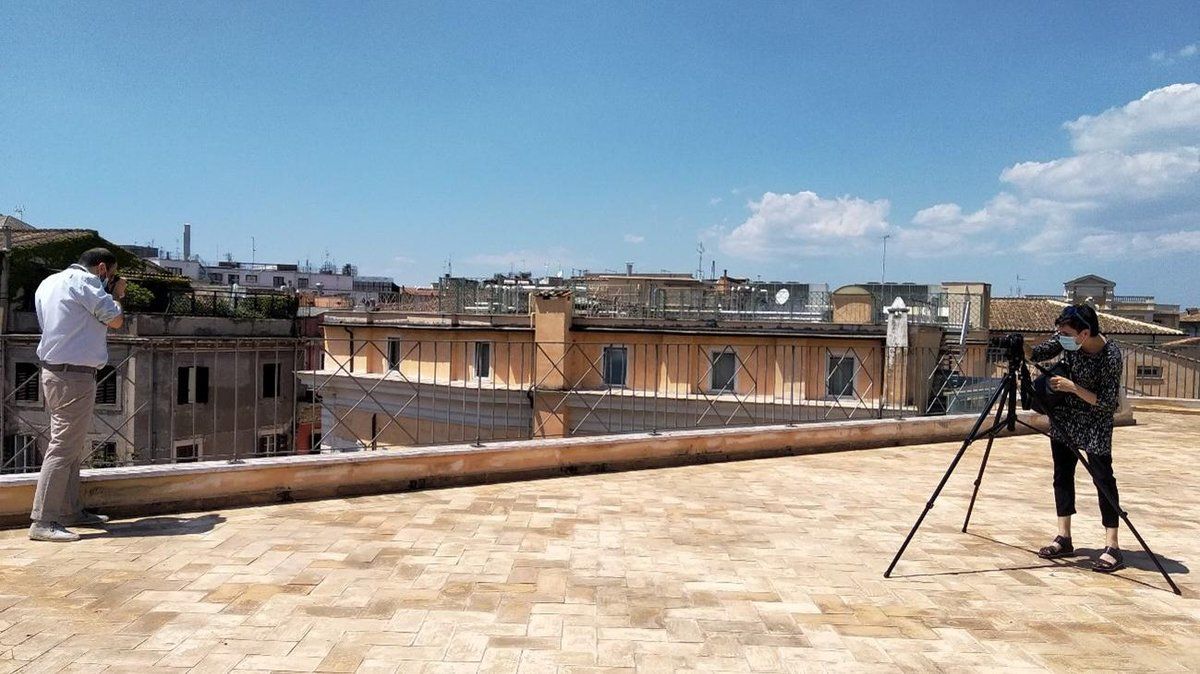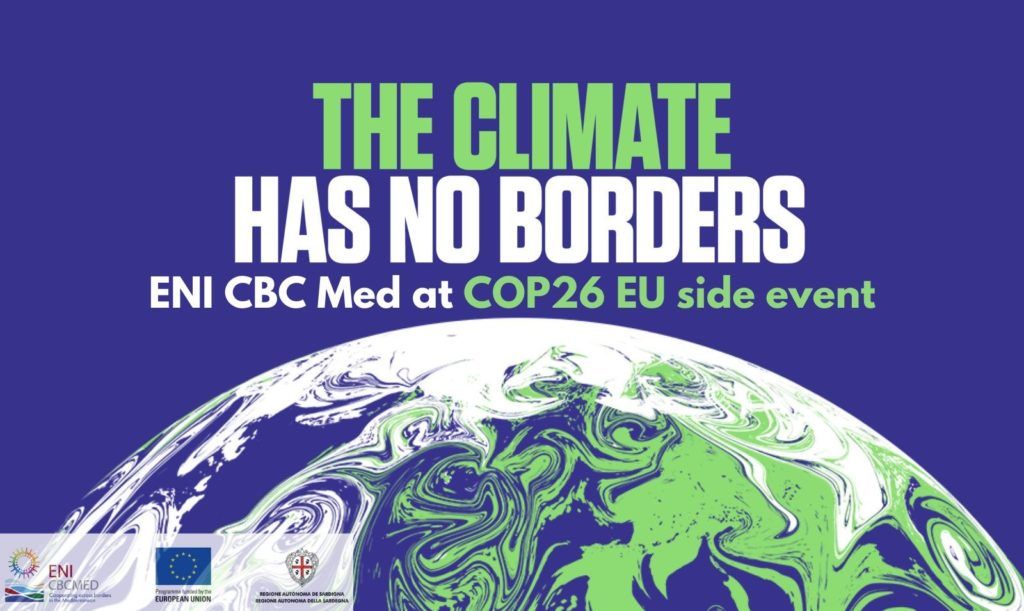The EU Green Deal upheld locally by MED partners
Reducing emissions, developing energy efficient buildings, moving towards a greener, carbon-free environment. Yes, limiting temperature increase is possible. Two ENI CBC projects – implemented within the framework of the ENI CBC Med programme – were showcased this year at the UN climate change conference COP26, highlighting their contribution towards a resilient, climate neutral future. Their achievements were shared with the audience at the EU digital side event, held during the UN conference on 9 November. It was the occasion to find out what Europe and its southern neighbours are doing for climate resilience and green recovery. Contributing to the race to limit temperature increase to 1.5ºC.
The European Union has set out to be the first climate neutral continent in the world by 2050 and the European Green Deal provides the roadmap to achieve this ambitious goal. However, the efforts of the European Union alone are not enough. At the COP26 EU side event, Henrike Trautmann – acting director of NEAR B Unit, the DG for the Neighbourhood and Enlargement Policy – clearly stated that working with the neighbours is key to achieve this milestone on a global scale. The event offered a good opportunity to display initiatives and activities implemented in the Mediterranean region, a key European partner for reasons of proximity, interdependence, and shared history. Ms Trautman stressed the urgency for the region to cooperate for the green transition, for climate resilience and to shift towards sustainable, low emissions economies.
The Union for the Mediterranean Ministers recently confirmed this urgency and approved in Cairo on 4 October a Declaration to set the basis for an ambitious approach to the COP26 discussions. The EU has also adopted earlier this year a joint communication and a renewed partnership engagement with the southern neighbourhood, where green transition is at the heart of the European efforts. Parallelly, the EU’s adaptation strategy – agreed in February 2021 – acknowledges the key role of local governments in pushing forward such change. The Green Deal and its external dimension require the active participation of cities and regions: local actors are better placed to identify climate actions that best meet community needs, they can ensure support to a real transition and ownership among the citizens. That is why local authorities are key agents of change in this endeavour.
The ENI CBC Mediterranean Sea Basin programme allows for the inclusion of these two “global + local” elements: it enables a fair, equitable development on both sides of the Mediterranean and it focuses on local, feasible actions to pursue the global objectives. In the south-east Med region, the energy consumption is expected to rise to nearly 118% by 2040. To face this challenge, the main objective is thus to increase the shift towards renewable energies, to  reduce dependency on fossil fuels, and to increase awareness about energy efficiency and conservation measures. During the COP26 EU event, it was emphasised that impactful local actions are based on four main pillars: the involvement of all citizens and stakeholders in the implementation of the action plans; an outstanding exemplary role played by the public sector to encourage everyone else; capacity building activities of different professionals to ensure a sustainable approach in the long term; and information and awareness sessions targeting local communities. The ENI CBC BEEP and ESMES projects were showcased during the event, as they combine all these four elements.
reduce dependency on fossil fuels, and to increase awareness about energy efficiency and conservation measures. During the COP26 EU event, it was emphasised that impactful local actions are based on four main pillars: the involvement of all citizens and stakeholders in the implementation of the action plans; an outstanding exemplary role played by the public sector to encourage everyone else; capacity building activities of different professionals to ensure a sustainable approach in the long term; and information and awareness sessions targeting local communities. The ENI CBC BEEP and ESMES projects were showcased during the event, as they combine all these four elements.
On the one hand, the BEEP project is using the innovative process of information modelling in the building sector to improve the energy efficiency and include renewable energies in heritage public buildings. The project partners are testing this emerging technology in 9 buildings, to demonstrate its scalability and develop one model that can be applied on a wider scale. On the other hand, the ESMES project focuses on the energy rehabilitation of public schools. Under the project, the energy consumption of 10 schools in 6 countries is being optimized and different strategies are developed to support efficient and cost-effective energy mix in school buildings. In addition, both projects are pursuing the capacity building of the construction sector professionals, they are developing training guides, establishing national energy hubs for sharing of best practices, and raising awareness at different levels, also among children.
It’s important to stress that these projects are capitalising on previous initiatives – like MED-DESIRE, funded by the ENPI CBC Med programme – that acted at a regulatory level, by establishing a set of mandatory standards for the solar photovoltaic panels and enforcing the local ordinance obligation to install solar water heaters in new buildings. It is therefore an on-going, comprehensive process, that starts on the implementation level, fosters awareness among the citizens and responds also to the regulatory challenge. Looking at the future, the results of these projects will be likewise capitalised in the newly launched MED SEACAP 4 SDG project, which will integrate, through uniform assessment and financing methods, the Sustainable Energy Access and Climate Action Plans (SEACAP) under a common vision, strategy and evaluation tool, in order to achieve the sustainable development goals in education and health buildings.
But it’s not all. Currently the EU is developing a new programme called Climate4Cities where local authorities are encouraged to form partnerships with NGOs, academic institutions, the private sector, and financial institutions for the implementation of integrated local actions with demonstrable climate impact. In this way, the EU is using its financial contribution to leverage additional funds from both public and private sources. If this pilot programme proves successful, there will be a great scope for further replication to channel funds to those who can make a good use of it for climate action, but do not have ways to access financial resources.
Finally, the European Commission is designing the programmes for the 2021-2027 programming period. Funding for climate change mitigation and adaptation will be at the forefront of financed activities. Local authorities and civil society will continue to play a leading role, and instruments such as the European Fund for Sustainable Development and the NDICI Global Europe Funding instrument will also be used for the cooperation between the EU and the Southern Mediterranean countries. As we begin to emerge from the Covid-19 pandemic, we must take the opportunity to build something better: in this regard, the EU is committed to work closely with its southern neighbours towards a successful “green recovery”.
